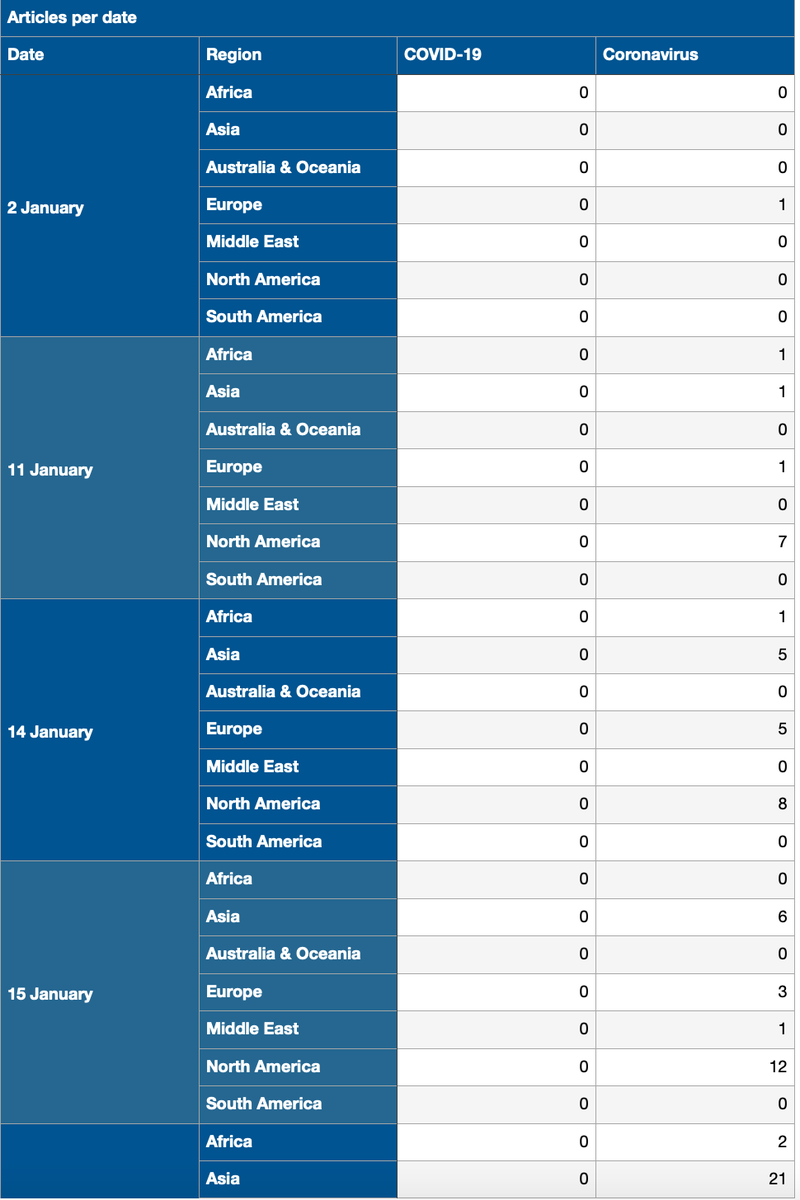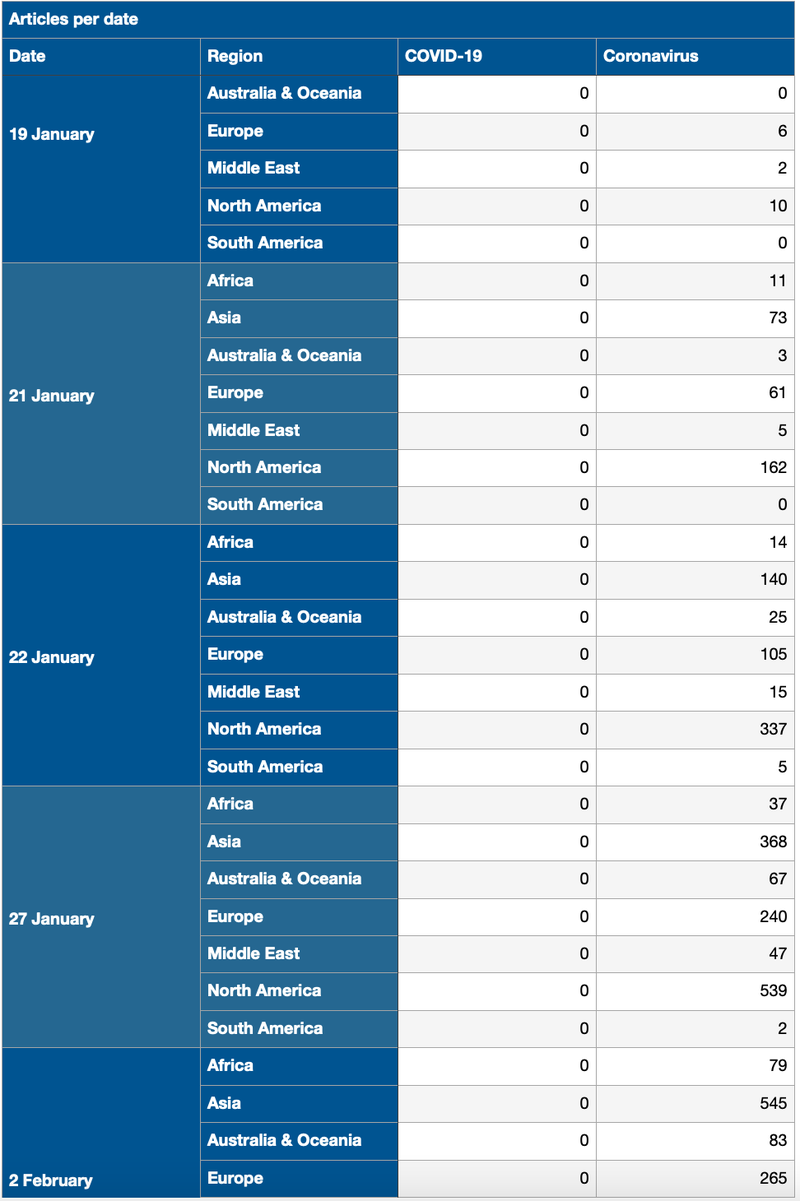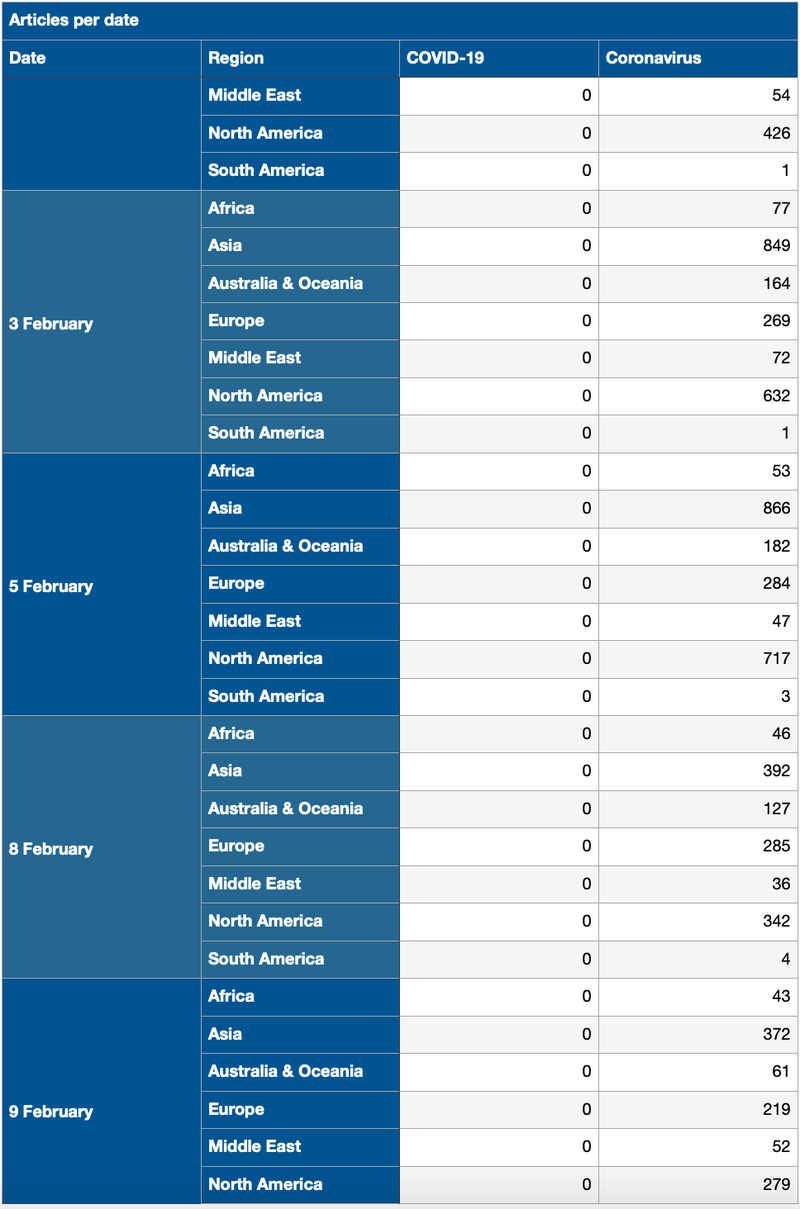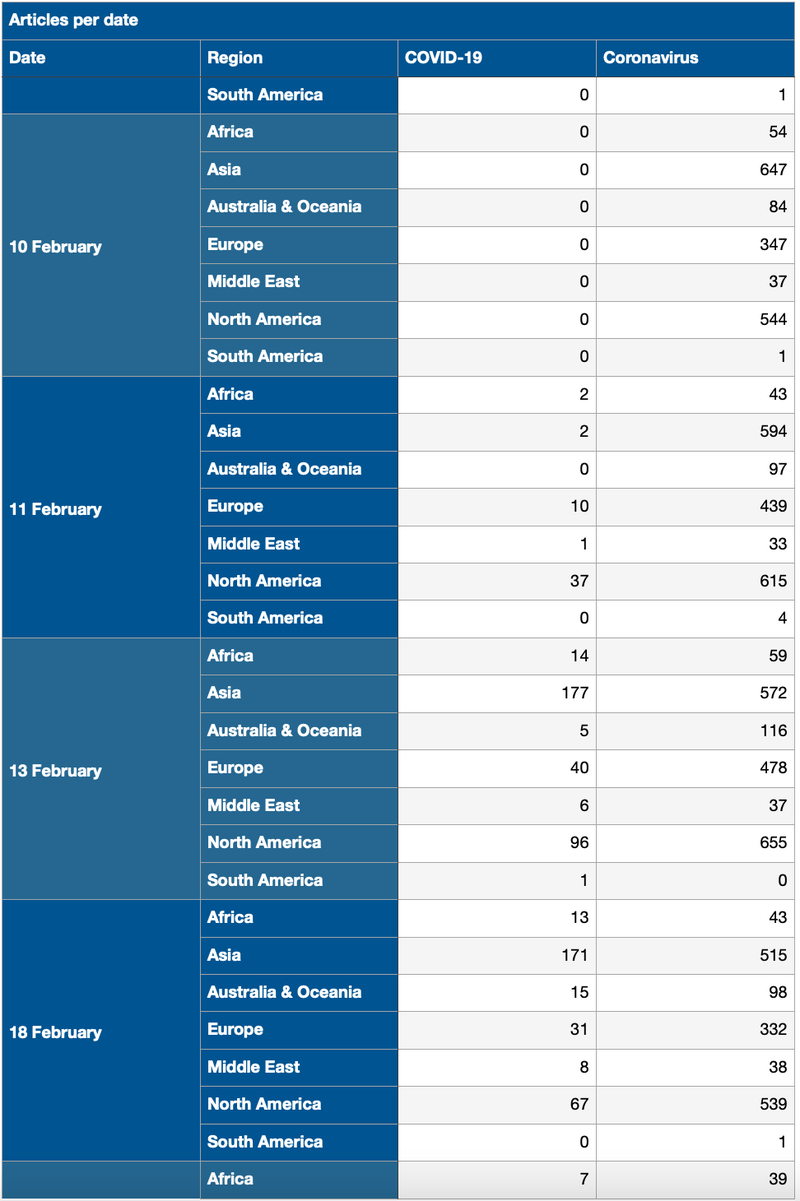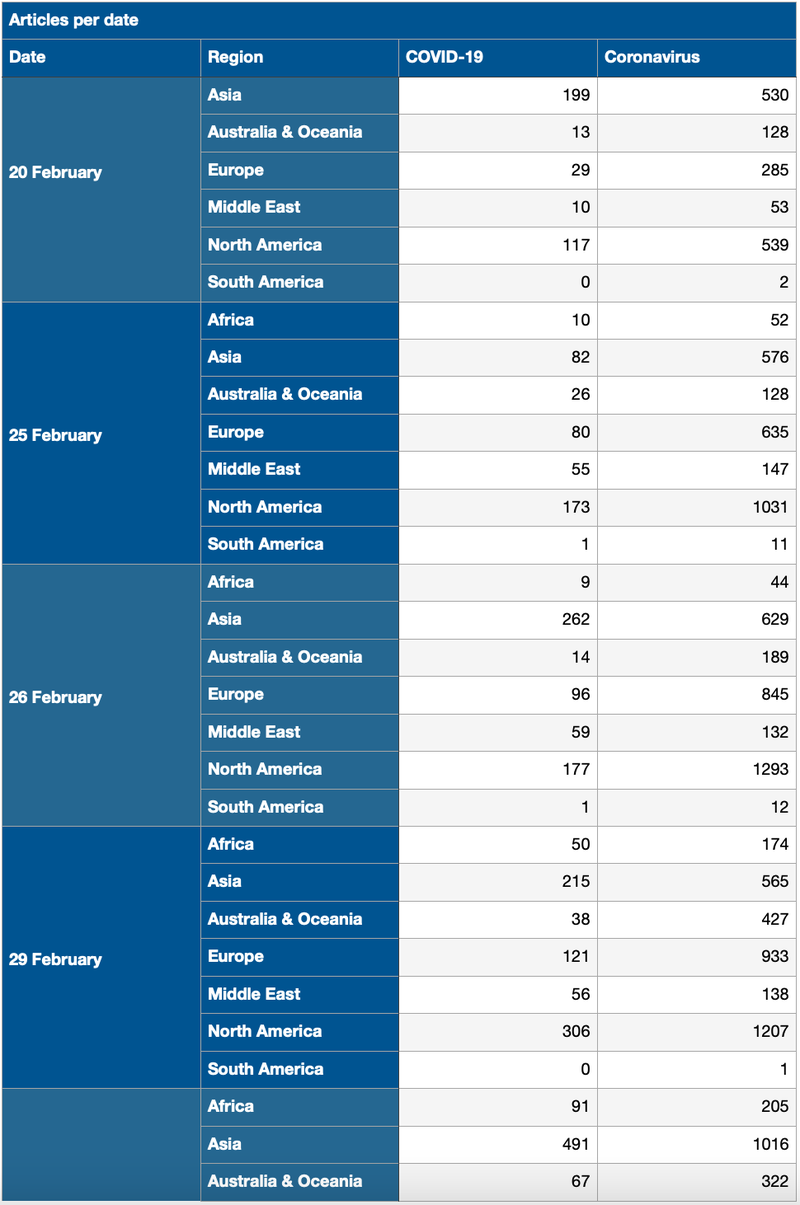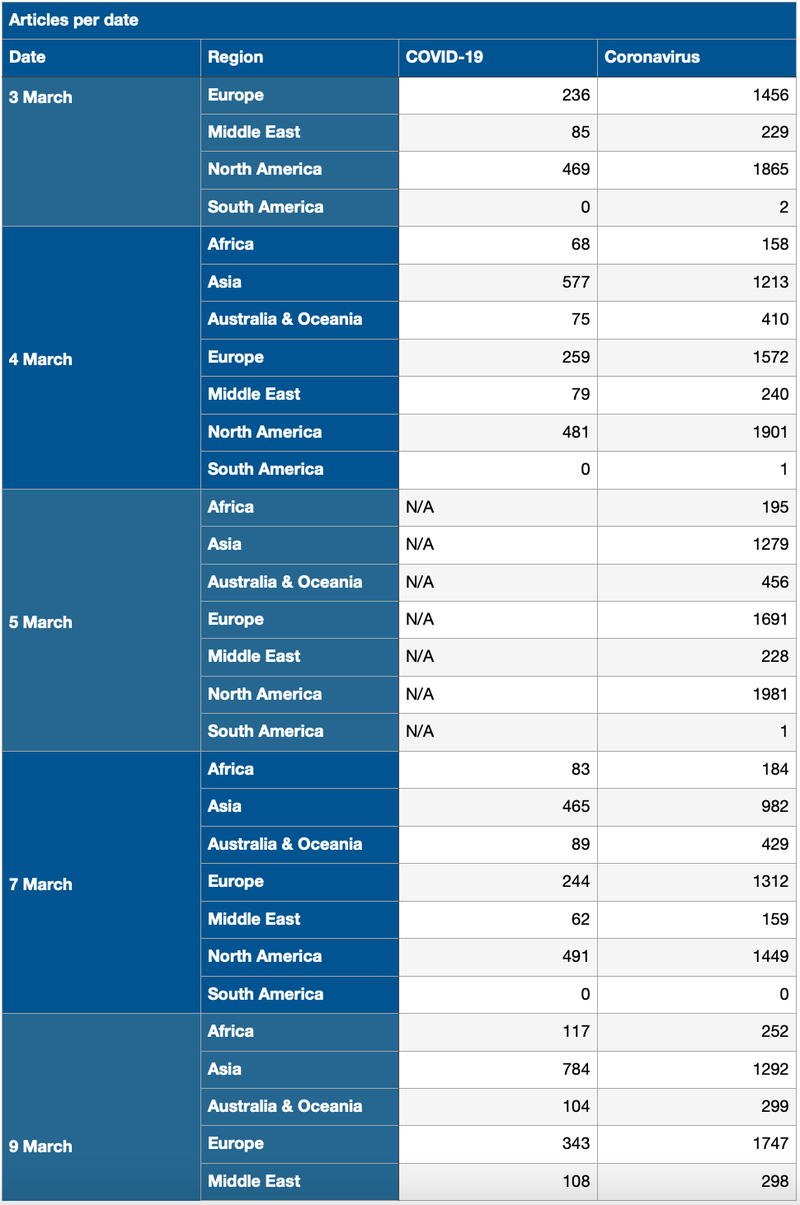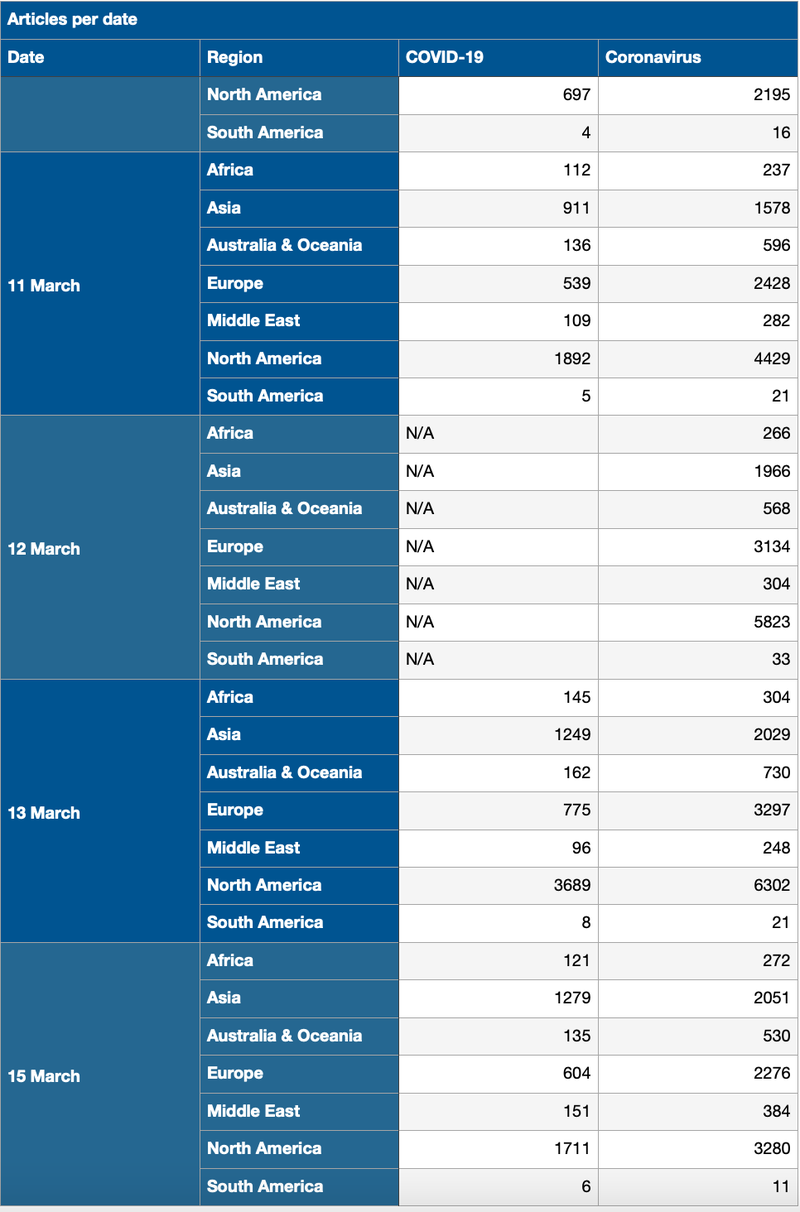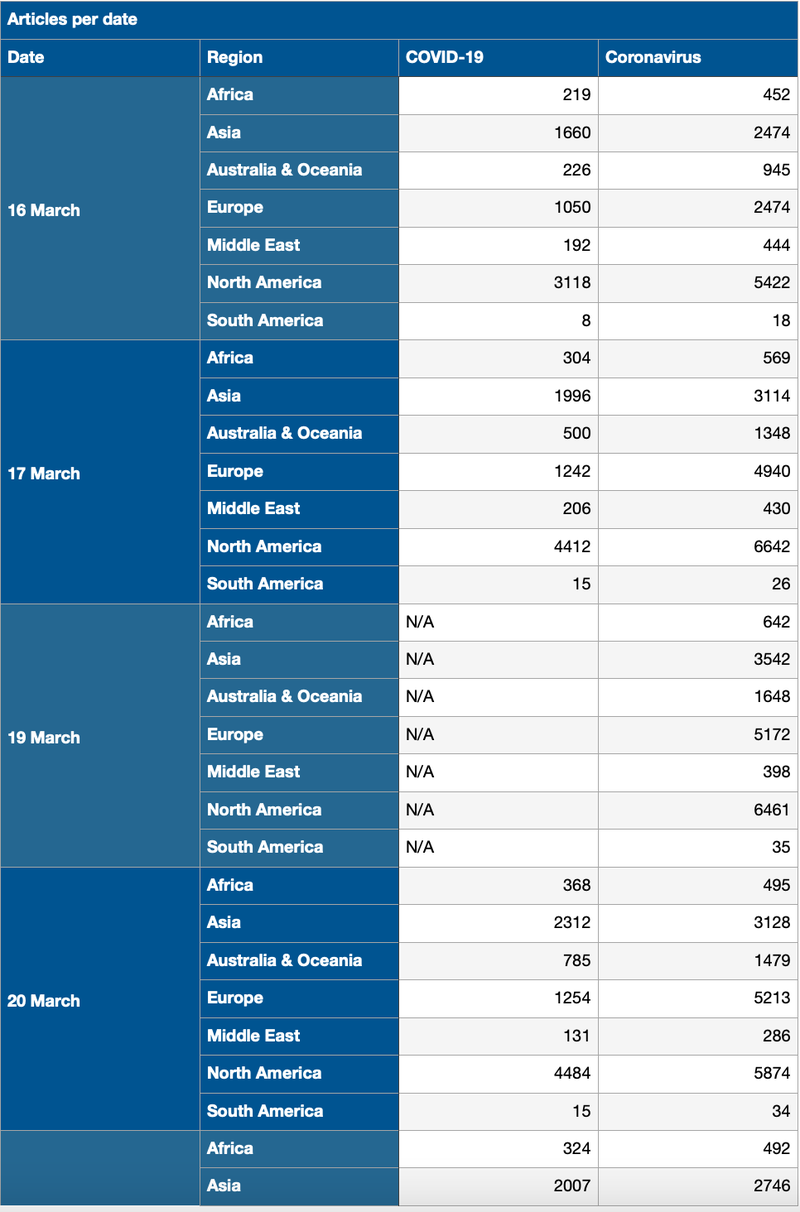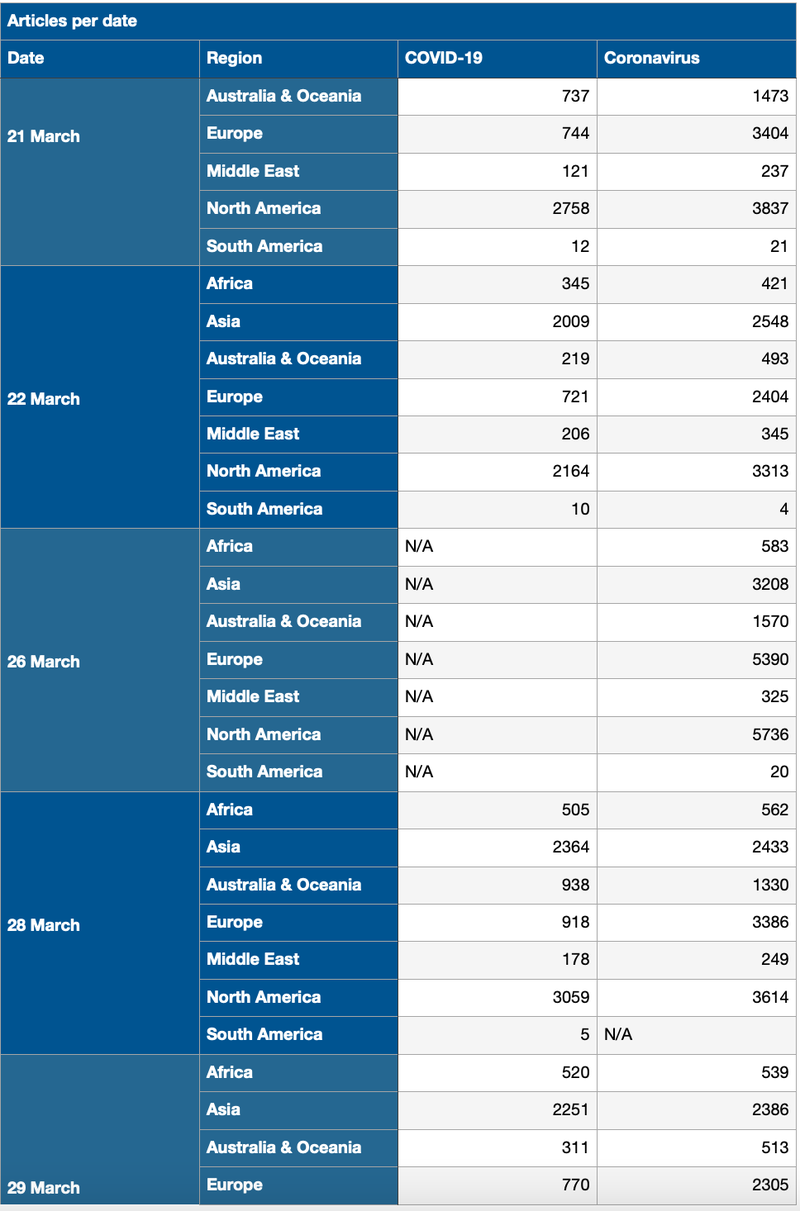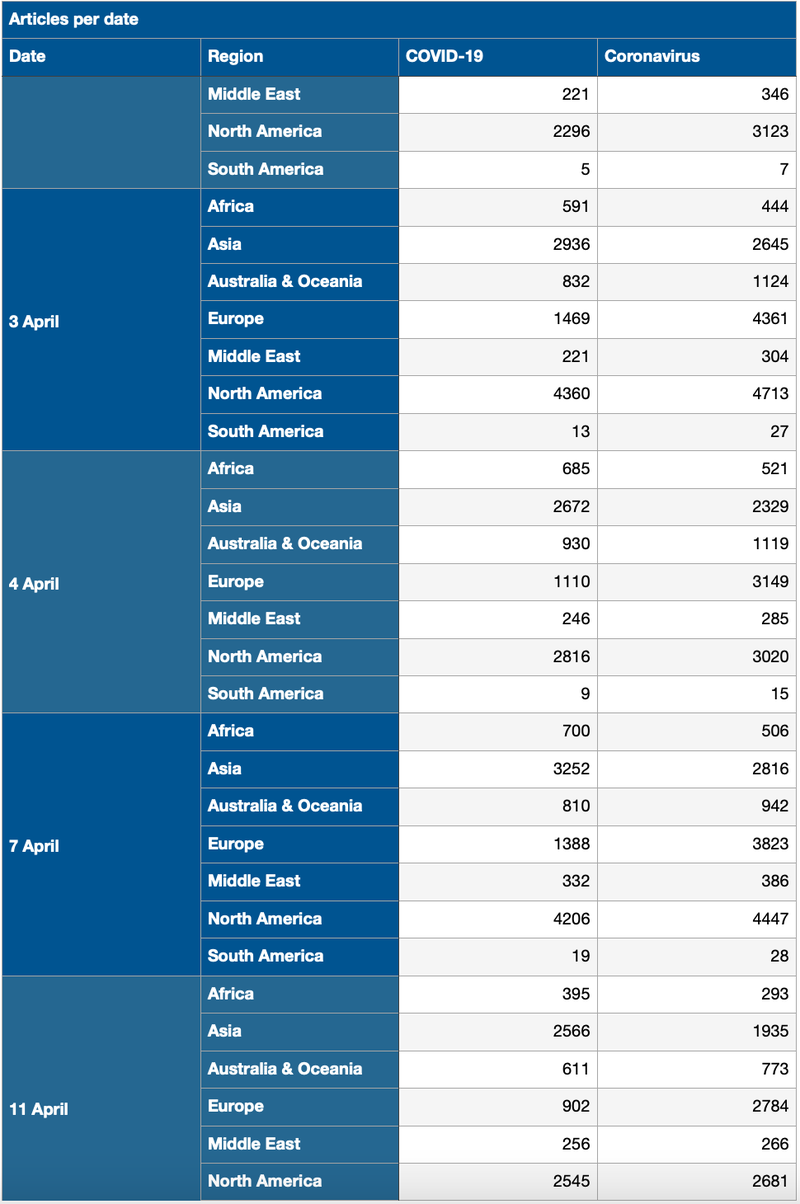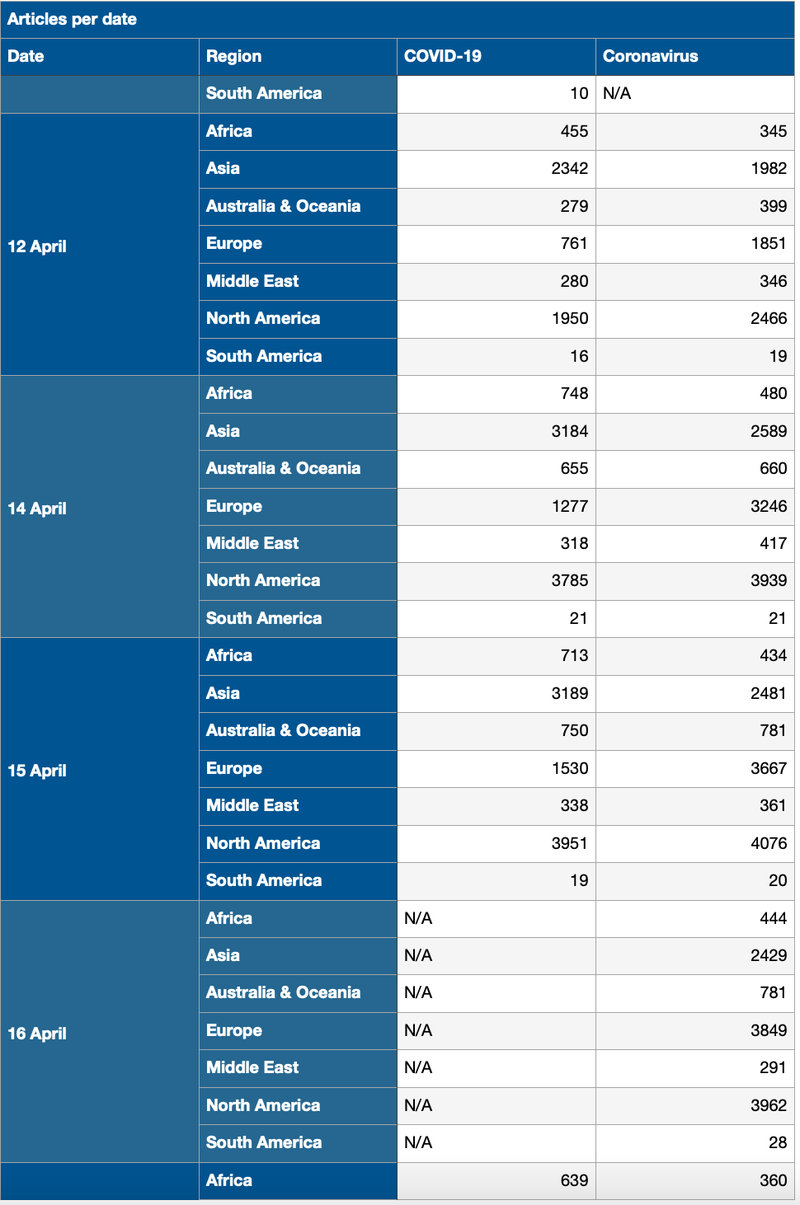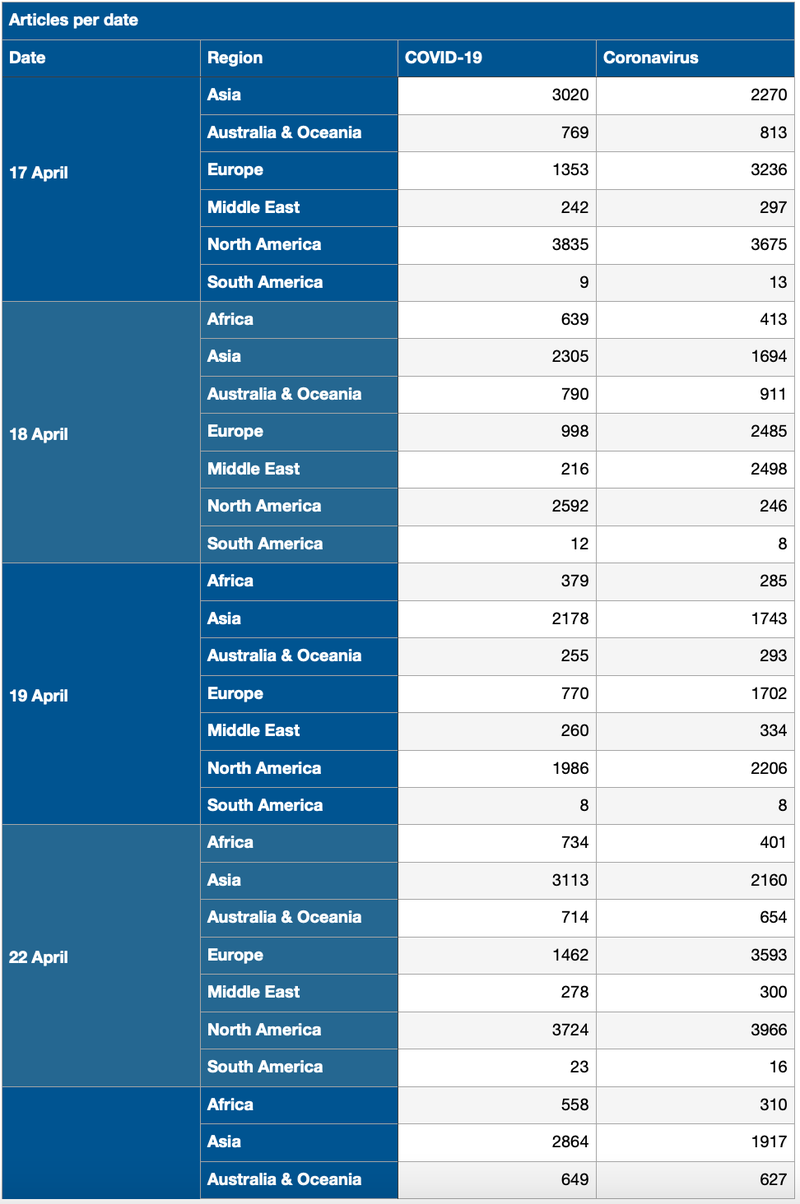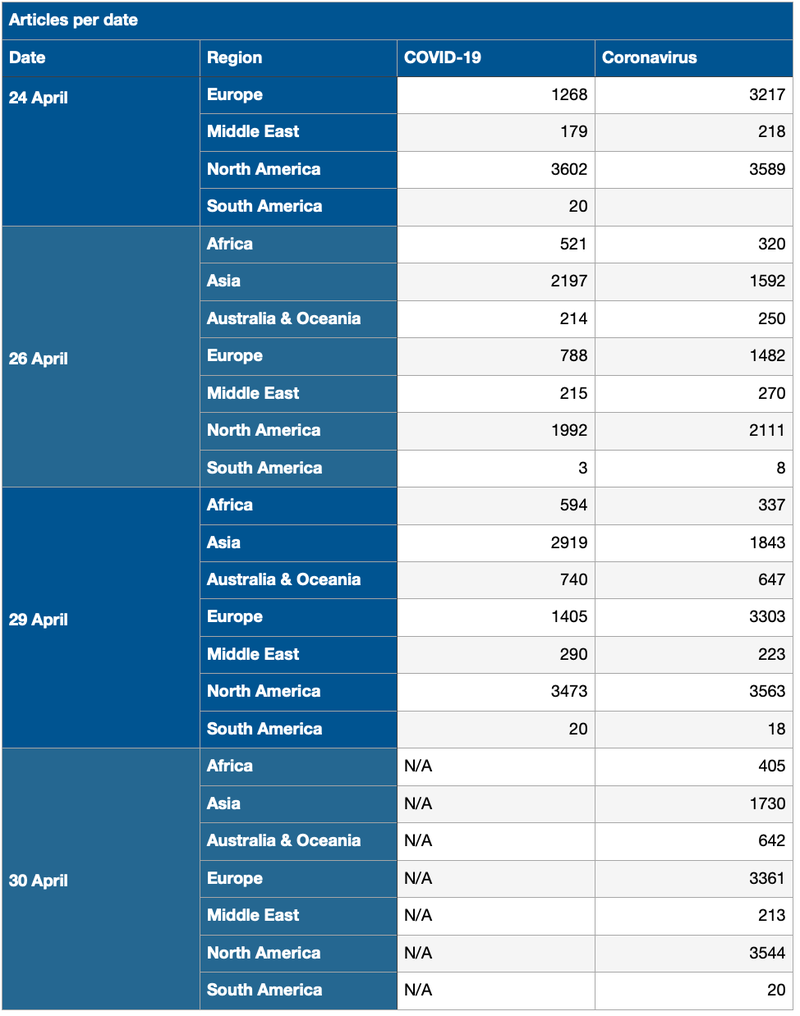Student ambassadors: Anita Baratti | Esther Kentish | Natalia Stengel Peña | Lindsay Warner
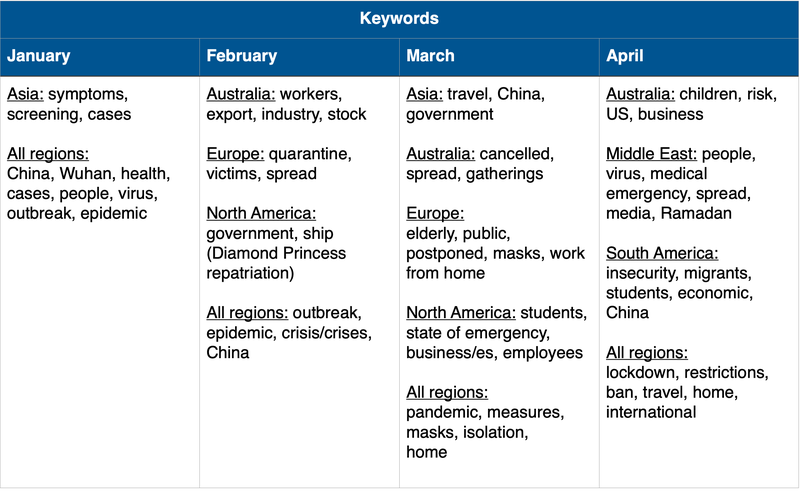
Aside from ‘coronavirus’ and ‘covid’, ‘health’, ‘cases’ and ‘people’ tend to appear the most frequently across all regions, and Europe was the first region to pick up usage of ‘Covid-19’ in early February (3rd February). However, Coronavirus is consistently used more frequently than Covid-19 in all regions.
The term ‘epidemic’ was used through January and February, which shifted to ‘pandemic’ by March and April. ‘Virus’ was used more frequently in January and February than it was in March and April, as was the term ‘outbreak’. As these terms lessened in usage, other terms grew in popularity, such as ‘measures’, ‘lockdown’ and ‘quarantine’.
Correlations:
● The term measures is mainly correlated to words reflecting the social sphere in Europe and Asia (home, isolation), while it is found mainly correlated to the economic and financial sphere in North America (businesses, employees, students).
● Throughout all regions and the entire period analysed, the word international shows to be mostly correlated to travel and spread, highlighting travelling as the facilitator for outbreaks. In January in Europe, passengers was correlated to the virus symptoms (cough, fever) and begin, while travel is often correlated to risk. Similarly, the word foreigner in South American news is correlated to contagions and cost, highlighting the risk that foreigners bring with them.
● Travel is still a major keyword in March and April, as the main catalyst for the global spread of the virus, and correlated to primary, emergencies, havoc, chaos, stuck.
● It is notable that China and Chinese are never correlated to words such as fear or panic, like it was found in other languages. Europe and North America are the only exceptions - Chinese correlated to blame and accountability.
● The word home, while being a keyword in most regions in March, does not spark relevant correlations - apart from North America, where it is linked to citizens, safety and necessary, thus suggesting a trend in favour of the domestic context. It is found in relation to quarantine, self-isolation, in the expression ‘stay-at-home rules’, but also home test kits, home shopping, home school, in-home health care and others, suggesting that certain forethought has gone behind the organisation of daily life in the domestic space.
- China is found correlated to aftermath, as the world is waiting to observe what the consequences of the restrictive measures taken there will be.
Discussion
North America, Asia and Europe typically have the highest numbers of articles in English, but an exponential increase in the number of articles can be seen in mid-March (e.g. March 16th had over 13,000 articles for coronavirus). This increase aligns with the timing of the lockdowns of many countries, e.g. UK, Italy, and Spain. These lockdowns also explain the change in language seen from the lessening use of ‘virus’ and ‘outbreak’, to the increasing usage of ‘measures’ and ‘quarantine’. It demonstrates the shift in public focus from trying to understand the nature of the disease and placing it geographically, to trying to understand and mitigate the impact that the disease will have on the everyday functioning of society in the region, and also understanding expectations of behaviour amongst this new normal.
Across most regions in January, there was a heavy focus on China/Wuhan, with a kind of distancing effect in the language where the virus was positioned as a ‘Chinese problem’, something that will mainly impact China and will only impact other regions through travel and business connections. This Chinese focus continues into February across the regions, though to a slightly lesser extent (especially in Europe), and is mostly gone by March and April as the focus shifts to how the writers’ regions were dealing with coronavirus.
The focus on ‘measures’ manifested not just in the changes to social behaviour (e.g. the word ‘home’ appeared 4515 times in Europe and 1399 times in Asia on Monday 16th March in the coronavirus searches), but also in the changes to business practice and the financial strains resulting from Covid-19 more generally. This was particularly true in North America, where ‘businesses’ (1788 manifestations) and ‘employees’ (2089 manifestations) took precedence through their frequent usage. There was also a larger focus on education in North America compared to other regions, e.g. ‘students’ were mentioned 2155 times across the coronavirus corpus on 16th March.
Most Relevant Day Specific Findings
Sunday 19th January 2020
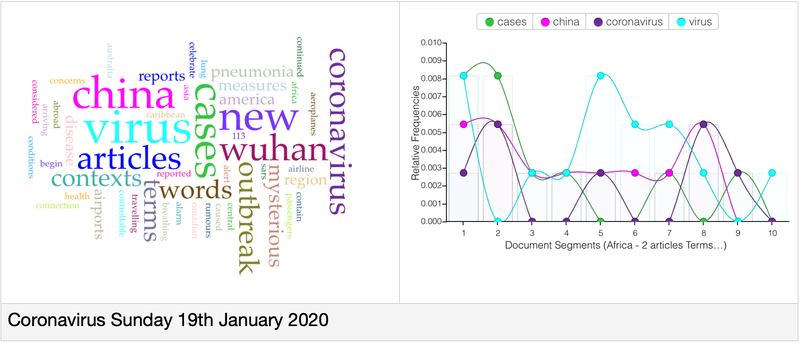
Coronavirus:
Africa - 2 articles
- Terms: cases (20), virus (12), China (10), Wuhan (9)
- Contexts: mysterious SARS-like virus, mystery virus, pneumonia cases, China reports new cases, detection work
- Correlations: ‘Coronavirus’ is correlated to words such as ‘alarm’, ‘connection’, ‘China’
Reports of first cases overseas.
Asia - 21 articles
- Terms: cases (142), Wuhan (113), China (105), coronavirus (98), outbreak (43)
- Contexts: prevention measures, new pneumonia cases, investigations are underway, breathing difficulties, mysterious lung disease
- Correlations: ‘Coronavirus’ is correlated to words such as ‘Asia’, ‘conditions’, ‘alert’, ‘airports’
No cases have been reported in China yet outside Wuhan (reported differently in Africa). But more screenings are being implemented to find whether and how the virus is spreading.
Australia and Oceania
No articles found for this region.
Central America & Caribbean
No articles found for this region.
Europe - 6 articles
- Terms: cases (32), Wuhan (44), China (40), outbreak (26), passengers (15)
- Contexts: virus outbreak grows, to step up countermeasures, mysterious new SARS-like virus, rumours about the virus
- Correlations: ‘Coronavirus’ is correlated to words such as ‘China’, ‘arriving’, ‘airline’
Interesting to see the word rumours to talk about the virus rather than reports, for example. This is probably due to the virus being considered still as a problem restricted to China at the time. In fact, the virus is described as ‘could spread to other countries’, rather than will, and by travelling. In this regard, passengers correlated to the virus symptoms (cough, fever) and begin. Great uncertainty, fear as a frequent word.
Middle East - 2 articles
- Terms: cases (18), virus (16), Wuhan (15), China (14), outbreak (8)
- Contexts: mysterious lung disease, continued testing, outbreak in Wuhan, coronaviruses
- Correlations: ‘Coronavirus’ is correlated to words such as ‘China’, ‘caused’, ‘contain’
North America - 10 articles
- Terms: new (64), China (54), Wuhan (49), virus (44), coronavirus (42)
- Contexts: cases of pneumonia, Canadian airports begin new health measures, outbreak of this new strain of viruses, new respiratory disease
- Correlations: ‘Coronavirus’ is correlated to words such as ‘abroad’, ‘controllable’, ‘concerns’
Particular worries about people who will be travelling to celebrate the Lunar New Year. Although prospects are positive: airports and aeroplanes are implementing new health measures, and the virus is seen as controllable.
South America
No articles found for this region.
Covid-19:
No articles found for any regions under this headline.
Monday 27th January 2020
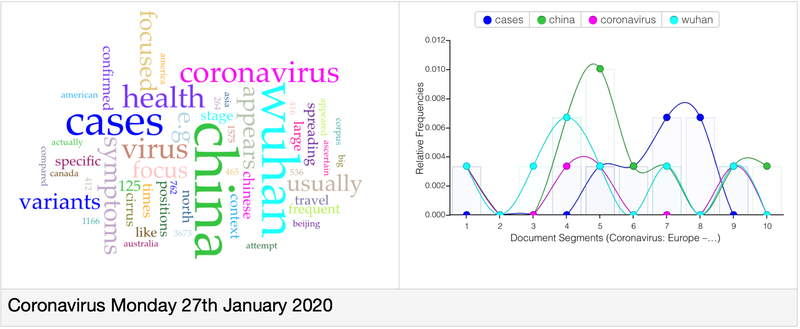
Coronavirus
Europe – China (1166) and Wuhan (1365) are both among the most frequent terms. Beijing is also on the cirrus at 125. Outbreak at 762, and symptoms at 378 – much less specific at this stage. Trying to ascertain what the virus actually was and more focused on the epicentre at that time. Virus at 1187.
Also, a focus on travel and global implications, e.g. in the cirrus, flight, holiday, spreading, lockdown, evacuate all appear 125.
Large focus on people stuck in Wuhan, as well as it is the origin, e.g. usually appears as ‘in Wuhan’ (465), ‘from Wuhan’ (264). Similarly, ‘in China’ (416). Positions coronavirus is something in China that’s spreading to the rest of the world via travel networks.
Australia – China (412) used it more frequently than Coronavirus (323). Chinese, China and Wuhan all appear. ‘confirmed cases’ only appeared 27 times, compared to the numerous times variants relating to China were used. More focused on what the virus is and its symptoms, rather than worrying about the level of cases.
Asia – also a large trend in putting it on China (China, Chinese, Wuhan), but there was more of an attempt to educate and say about symptoms (269), screening (126) and cases (536).
Cases usually appear in the context of either speculative (different variants implying this, like potential, possible, suspected) cases or confirmed/positive cases. Numbers also appear beforehand.
Health (962) usually appears in the context of its title in public official/institutional positions, like health minister, or health desk
North America – Most frequent words in the corpus: coronavirus (3673); china (2120); health (1991); virus (1575); wuhan (1471)
Still, big focus on China (2120) and its variants seemed more focused on specific North American sports and the impacts there, e.g. Canada, Ontario, Toronto. Epidemic (349) was used at this stage.
Sunday 02 February 2020
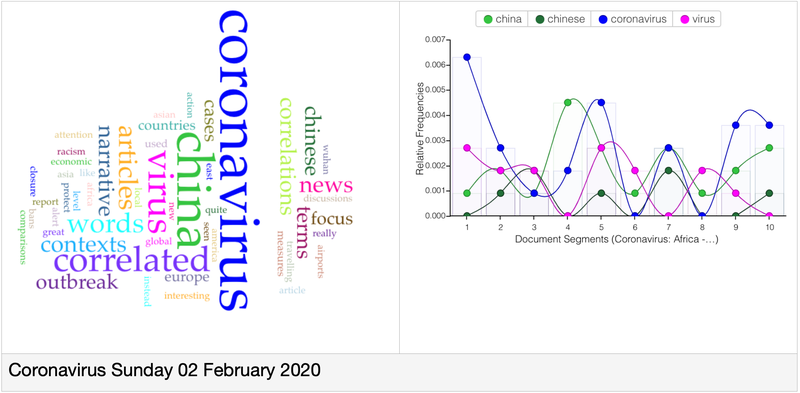
Coronavirus
Africa - 79 articles
- Terms: coronavirus (557), China (387), virus (205), news (184)
- Contexts: averting coronavirus outbreak, infections soar, coronavirus fears, ways to protect yourself
- Correlations: ‘Coronavirus’ is correlated to words such as ‘confirm’, ‘cancelled’, ‘avert’
Very worried narrative, where various African countries prepare for an eventual outbreak on a local level – very different from Europe at this time, which instead still saw covid as an “Asian problem”. Fear, protection, monitoring are words highly correlated to virus. Correlations also show a great awareness of the threats that covid brings – virus is, in fact, also positively correlated to rapidly and elderly. ‘Africa mobilises against coronavirus as fears mount’
Asia - 545 articles
- Terms: coronavirus (3049), China (2181), news (1444)
- Contexts: precautionary measures, the challenge of containing coronavirus, keeping coronavirus out, new cases reported worldwide, screening of Chinese settlements
- Correlations: ‘Coronavirus’ is correlated to words such as ‘alert’, ‘authority’, ‘airports’, ‘arrive’
Really great global narrative, with a worldwide focus – from US, Canada, to UK, Europe, and Africa, but a major geographical focus on south-east Asian countries - especially the development of the disease in China. Reports on countries outside of Asia are mainly about whether they are or are not preparing for the virus to spread, with the main link to government. Heavy focus on travelling as the reason for which the virus is spreading, with travel being correlated to risk, prohibited. Similarly to Italian, there is a focus on the movement of the virus. It is seen as an external foreign, which is described as ‘arriving’ in other countries, and these countries are trying to ‘keep coronavirus out’. Yet, China is a keyword, rather than Chinese, which is still incredibly frequent (1103), but is not linked to the virus in any racial way, and instead is simply used from a geographical standpoint (Chinese cities, authorities, arrangements, new year etc). It is also notable that the word is not correlated to words like panic etc, contrary to other languages. Very report-like narrative.
Australia and Oceania - 83 articles
- Terms: China (418), coronavirus (402), news (287)
- Contexts: band on China, China bans live import, travellers from/who have been through mainland China, increased the threat level
- Correlations: ‘Coronavirus’ is correlated to words such as ‘closure’, ‘alert’, ‘anxiety’, ‘borders’
Many comparisons to the SARS emergency in 2000 highlight that the world is more technically prepared for an epidemic, so encouragement not to panic. In general, a very positive view of the situation – ‘the worst may never happen’ – while also taking precautions – travelling from China being banned etc. News suggest concentrating on ‘more worrying trends’, such as the ‘rise in xenophobia and racism’ being seen around the continent. Also discussion around Oceania’s economic dependence on China. China is correlated to closure, assess, advice.
Central America & Caribbean
No articles found for this region.
Europe - 265 articles
- Terms: coronavirus (1449), China (970), virus (608), Wuhan (607)
- Contexts: kill the deadly virus; how dangerous is it? virus fear grips markets, Chinese arrivals bans, suspected cases, race against time
- Correlations: ‘Coronavirus’ is correlated to words such as ‘agreements’, ‘assessing’, ‘controversy’
Discussions on whether Dettol disinfectant kills coronavirus or not. Interesting to see that many articles’ headlines are questions: ‘fight or flight?’, ‘how dangerous is coronavirus really?’, ‘are we at risk?’, ‘are we headed for a full-scale pandemic?’, ‘can ANY mask really protect you?’, ‘could the coronavirus outbreak create goods shortages?’ and so on. The narrative is very conversational: not much formal writing and not very report-like - almost no reports on cases found around the world, numbers etc (like AU, for example). There is a lot of speculation, especially on what the virus could do to both the global and local economic markets and reflections on how to ‘offset the effects’. Many conditionals found – could, would, should etc. Many articles condemn the measures taken in China to contain the virus – lockdowns, masks, screenings, tests, quarantine – as a ‘heavy-handed approach’ which ‘could make things worse’, ‘the opposite of ideal’, ‘draconian’, as well as a violation of human rights, which is consistent with the UK’s position on restrictive measures at the beginning of the pandemic. China is correlated to aftermath, as the decisions taken are unprecedented, and economists attempt to picture the future effects. Travelling does occupy a big place in the narrative, but not nearly as much as in the other regions. Talking of China is less attentive: the word Chinese is often used insensitively and also correlated to blame and accountability.
Middle East - 54 articles
- Terms: coronavirus (390), China (275), Chinese (121), cases (118)
- Contexts: a threat to us all, trade war, school coronavirus safeguards, protect employees
- Correlations: ‘Coronavirus’ is correlated to words such as ‘clarify’, ‘action’, ‘caution’
Quite a global narrative, covering news of cases in most of the Middle East, India, Israel and mentioning UK and USA plans to deal with the outbreak. Oman suspends all civilian flights to and from China. Saudi Arabia focuses on schools and how to deal with Umrah season. Quite a practical narrative, simple and straightforward, and news recounted more in a storytelling sort of way. Combat language is standard - ‘fight the outbreak/the virus’, and economic focus is relevant. Also, interesting discussions regarding the naming of the virus and its comparisons to SARS. While some articles are also against China’s containment measures, the language is softer than what is found in Europe.
North America - 426 articles
- Terms: coronavirus (2802), China (2235), news (1260), people (1029)
- Contexts: worry and boredom set in Wuhan, adjust to a new reality, effect on oil market, coronavirus scare, anti-disinformation campaign
- Correlations: ‘Coronavirus’ is correlated to words such as ‘Asians’, ‘containing’, ‘battle’, ‘communities’
Particular attention was paid to racism being seen around the US and speaking out against it. Racism is defined as a ‘symptom of virus’. Highlighted in Contexts is an interesting article on UC Berkeley facing backlash, stating that xenophobia is a normal reaction to the coronavirus emergency (CNN). On the other hand, when talking about China, there is a noticeable lack of linguistic sensitivity, similar to Europe – ‘In Wuhan, China, where they started the coronavirus outbreak’. Coronavirus balance is used to report the number of deaths instead of death toll, used by all other regions. Great focus on travelling and discussions regarding the causes of the outbreak – ‘the danger of ignoring the impacts of humans on nature’. The narrative is quite local to the US, with some attention paid to cases being found outside of China.
South America - 1 article
- Terms: coronavirus (11), Chinese (7), China (6), funeral (6)
- Contexts: strict protocol of action, the government on maximum guard, funeral traditions prohibited
- Correlations: ‘Coronavirus’ is correlated to words such as ‘airports’, ‘control’, ‘bodies’
Covid-19:
No articles found for any regions under this headline.
Monday 10th February 2020
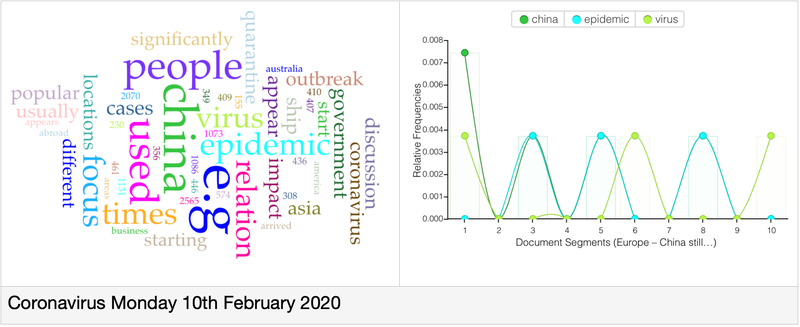
Coronavirus
Europe – China is still in the discussion but less so, e.g. China (1086), Wuhan (574).
Health, cases and virus are still among the most popular/frequently used terms.
Quarantine (410) starting to appear more in relation to locations (e.g. facilities, locations, centres) or to people (e.g. people, victims).
Shift from speculation about the disease to realising we need to contain it as much as possible, e.g. Spread (446).
Australia – China is still significantly in the discussion (230). Epidemic only used 28 times. There’s more of a focus on economic/business impact, e.g. factors, workers, exports, industry, stock, and supply all appear in the cirrus at 155.
Asia – still a significant focus on China (2565), starting to see more of a focus on different areas of Asia and the impact there, e.g. Shanghai, Singapore, Hong Kong.
Epidemic used 461 times.
Outbreak used 1073 – implies a kind of looking back to see how we arrived where we are with the virus. ‘Coronavirus outbreak’ appears 308 times.
Masks start to enter more into the conversation (356) – as people start to buy them more and as it starts to be recommended that you wear them for protection.
North America – China is still a significant part of the convo (2070). Second popular term after coronavirus. Epidemic (436). Quarantine (409) but usually in the context of people stuck abroad and procedures upon return. Ship (349) – about the cruise ship Diamond Princess mostly.
Cases (1131).
Government (407) – usually in relation to the Chinese government and how they are handling the virus, typically in relation to statements put out. But also about how governments in different countries are reacting too, but less so.
Sunday 15th March 2020
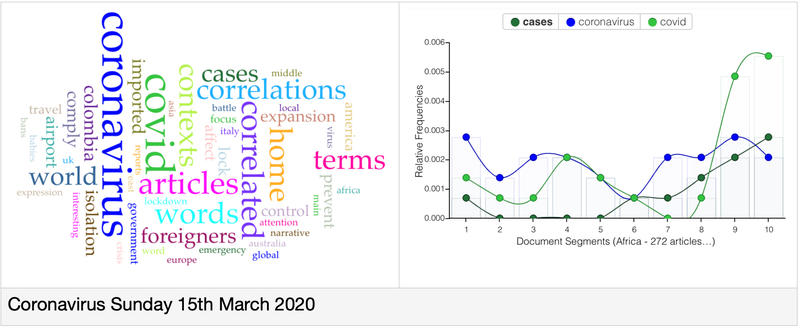
Coronavirus
Africa - 272 articles
- Terms: coronavirus (1467), covid (433), virus (415), government (3109, world (298)
- Contexts: precautionary measure, preparing people, economically vulnerable, repatriations, protect passengers, staff and workforce
- Correlations: ‘Coronavirus’ is correlated to words such as ‘cautionary’, ‘arrives’, ‘church’
It is interesting to see that articles talk about ‘preparing people’ for the emergency rather than ‘preparing the country/continent’, suggesting a more local and sociological approach to the crisis. People is correlated to devastating, assist, affecting. Many reports on the suspension of church activities and masses and sermons being streamed online.
Asia - 2,051 articles
- Terms: coronavirus (9871), covid (3655), government (2728), cases (2294)
- Contexts: must follow government instructions, declared medical emergency, courts postpone hearings, free access to medical needs, panic selling
- Correlations: ‘Coronavirus’ is correlated to words such as ‘country’, ‘organization’, ‘personal’, ‘guidelines’
The main focus is cancellations and closures, as well as how hospitals and the public health systems organise spaces and treatments for patients affected by covid. Particular attention to the extenuating shifts of healthcare workers all around Asia. Some focus on Iran, Italy, US and UK, where the UK is said to ‘fight rumours’ (going back to January’s expressions), and Italy is seen as raising the issue of whether the western healthcare system will be able to cope with the pandemic. Aside from this, very local narrative. Quite big attention to celebrities worldwide and how they engage with the pandemic – ex. Priyanka Chopra found herself in India just before the beginning of the crisis and then spent the lockdown at home. Coronavirus is seen as casting ‘an ominous shadow over the world’.
Australia and Oceania - 530 articles
- Terms: coronavirus (2332), travel (556), government (550), home (541)
- Contexts: free up hospitals, well equipped, originated with travel, all your burning questions, events impacted, coronavirus roller coaster ride
- Correlations: ‘Coronavirus’ is correlated to words such as ‘babies’, ‘alert’, ‘careful/ly’
In addition to standard news articles, columns and rubrics are very common – ‘all your burning questions’, ‘6 steps you can take to protect yourself and your loved ones’, ‘Coronavirus: your definitive guide’. Reports of some New Zealanders stuck in Italy – how they’re living etc. Greater focus on the economy and fewer numbers reported compared to February. Among patients, pregnant women and their babies are being carefully treated, as the effects of covid on them are not known. Travel is still a major keyword, as the main catalyst for the virus's global spread, and correlated to primary, emergencies, havoc, chaos, stuck. Neutral language and narrative.
Central America & Caribbean
No articles found for this region.
Europe - 2,276 articles
- Terms: coronavirus (13030), virus (3417), government (3074), covid (2607), UK (2582), home (2392)
- Contexts: global scientific battle to defeat covid, football still thrives, Germany to close borders, travel industry being tested, what UK can learn from Italy
- Correlations: ‘Coronavirus’ is correlated to words such as ‘care’, ‘lockdown’, ‘medical’, ‘decision’
Focus on Europe, and special attention paid at how each country’s response to the crisis reflects their national characteristics. Similarly to Australia, discussions around pregnant women, children and babies and their response to covid. Supermarkets announce new limits on items that shoppers can individually buy. The UK is currently in ‘partial lockdown’ and the news reports Johnson statements about a total lockdown not being necessary at this stage. Travel is also still a keyword, with many reports on how ‘coronavirus is wreaking havoc on the world of travelling’. The words battle and war are not high in frequency (167 and 331), but do come up with high relevance in Contexts and Correlations – battle seems to be consciously preferred over war in general, as war is used to report on global conflicts. Fear and similar terms are very low in frequency and do not come up as relevant – this is consistent with all other regions, apart from Africa. Panic is slightly more popular, but mainly in relation to the expression panic buying. Interesting expression found – category error linked to people’s reaction to covid.
Middle East - 384 articles
- Terms: coronavirus (2110), covid (451), ministry (370), home (243)
- Contexts: approve emergency economic package, lockdowns and entry bans, stay at home, work from home
- Correlations: ‘Coronavirus’ is correlated to words such as ‘anxieties’, ‘battles’, ‘calamity’
Reports on Middle Eastern countries and how they are dealing with lockdowns, cancellations, suspended productions and travel bans. Scepticism expressed toward restrictive measures, seen as a ‘solution [that] could be making the problem worse’. When talking about local cases, deaths and personal issues, it is interesting to see that the articles’ main focus is on the government and on western ex-pats living in the Middle East rather than on the local population – in this regard, would have been good to have had a more proper look at what newspapers are being picked up by LexisNexis, but unfortunately, I wasn’t able to retrieve this information from the original link. Combat language is not relevant – the only battle is used once in a while but with no consistency. While home appears as a frequent word, no relevant correlations were found.
North America - 3,280 articles
- Terms: coronavirus (19524), covid (7152), public (4066), home (3920), city (2830)
- Contexts: state of emergency, airport checks widened, future economic fallout, life during the coronavirus pandemic, the paranoia of coronavirus
- Correlations: ‘Coronavirus’ is correlated to words such as ‘staying’, ‘temporary’, ‘concerned’, ‘vulnerable’
Very general discussion of what is happening around the world, with no precise narrative focus – many angles considered. The US is not considering national lockdown at this stage and simply looking at the development of the situation in Europe, but closing offices and schools for two weeks, as they start seeing cases spreading around North America. The word home is correlated to citizens, safety, necessary, suggesting a trend in favour of the domestic context. The word is found in relation to quarantine, self-isolation, in the expression ‘stay-at-home rules’, but also home test kits, home shopping, home school, in-home health care and others, suggesting that certain forethought has gone behind the organisation of daily life in the domestic space.
South America - 11 articles
- Terms: coronavirus (72), Colombia (38), foreigners (22), isolation (20)
- Contexts: imported cases of Covid-19, prevent expansion, and the world locks itself in
- Correlations: ‘Coronavirus’ is correlated to words such as ‘comply’, ‘affect’, ‘airport’, ‘control’
Great attention is paid to Cuban asylum seekers and migrants waiting at the Mexico-US border, whether and how they are being given the chance to protect themselves. Colombia ‘bans foreigners from entering’ – use of the word foreigners not found in the research before, interesting connotation. The word is correlated to various continents/countries, as well as contagions and cost, highlighting the risk that foreigners bring with them. This is particularly interesting when considering that the virus is also identified in its foreignness in most linguistic narratives and that the cases are described as ‘imported’ rather than ‘found’. Venezuelan doctors travel to Italy to ‘join the fight against coronavirus there’. The narrative is very precise and formal.
Monday 16th March 2020
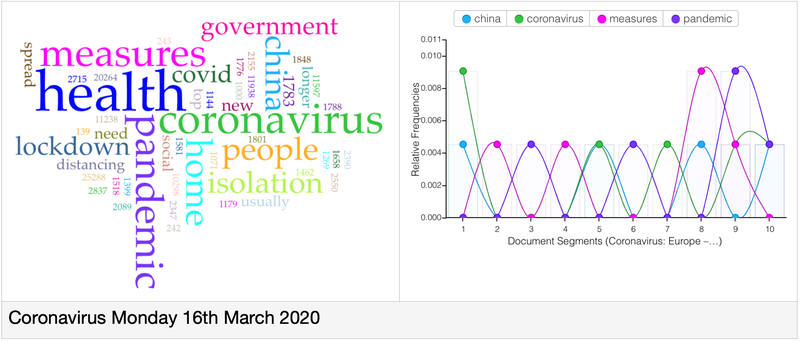
Coronavirus
Europe – China no longer in top 5 most frequent terms,
coronavirus (20264); people (10298); health (6310); time (5718); end (5709)
symptoms (2347), outbreak (3551), elderly (1658), public (3756), spread (2837), home (4515), postponed (1518), ‘work from home’ (349), isolation (1783), social distancing (541), measures (2550), lockdown (1071), school closures (243), masks (330), pandemic (2715)
As more understanding about the disease comes, we begin to recognise the impact needed to contain vulnerable groups. Knowing that ‘measures’ need to be taken but not as widely publicised, the main measure is isolation and social distancing.
Australia – China is no longer in the top 5
coronavirus (2390); new (1776); people (1462); health (1269); virus (1144)
government (835), cancelled (532), home (740), pandemic (242), spread (467), gatherings (300), lockdown (139), isolation (455), health – as in the health care system, people’s health, and health ministers, health advice.
Asia - coronavirus (9362); covid (4527); people (3892); health (3788); cases (3163)
Government (3098) – usually in the context of the measures they’re implementing, quarantine (1581), China (1783), measures (1848), travel (1000), home (1399), isolation (851), lockdown (502), pandemic (1179).
North America - Coronavirus (25288); health (11938); people (11597); covid (11238); new (8632)
Pandemic (4810), government (4917), measures (4166), china (1801), students (2155), businesses (1788), state of emergency (599), employees (2089),
Pandemic usually appears with coronavirus or covid-19 preceding it.
Sunday 29th March 2020
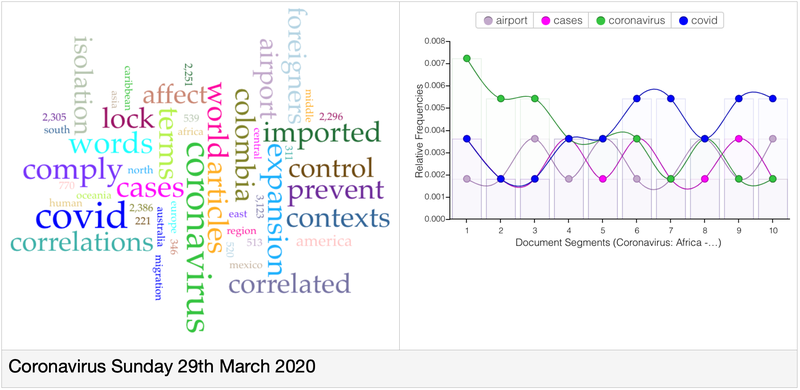
Monday 06th April 2020
Covid-19:
Middle East - Pandemic (303), Covid-19 pandemic (97), People (385), Travel (42) - restrictions, ban, advice. Measures (215), Virus (310), International (181).
Monday 13th April 2020
Covid-19:
Australia - covid (1192); people (788); new (762); sources (665); health (590), Coronavirus (439), cases (536), home (319), Pandemic (300), crisis (217)
Middle East - Most frequent words in the corpus: covid (956); coronavirus (515); health (446); al (437); cases (322), Medical (190), Travel (29), International (101), Spread (170), Home (206) - stay-at-home/work from home, testing.
Sunday 26th April 2020
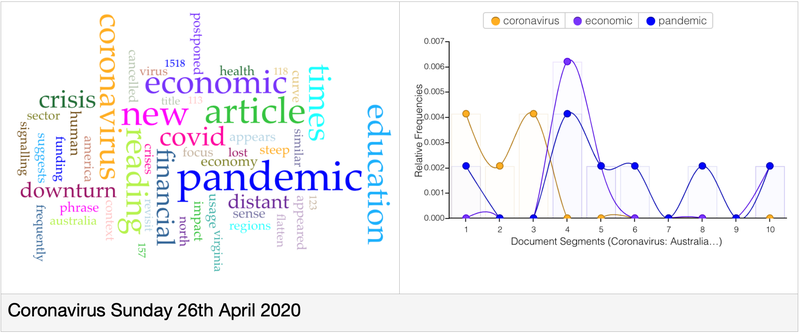
Coronavirus
Australia –
coronavirus (487); new (385); people (378); covid (340); end (287)
government (213), isolation (56), pandemic (157), health (234), children (113), lockdown (118), restrictions (73), china (10), business (123)
New sometimes in the context of New Zealand and sometimes in the context of new cases.
North America - Close reading analysis of one article (under head Coronavirus): ‘Virus upends plans to boost Va. education funding; It was a landmark year for education funding in Virginia – until COVID-19’.
As the title suggests, this article has a large socioeconomic focus, which aligns with the themes of the distant reading, in which North America demonstrated a larger focus on the economy and education than other regions. While the article did not demonstrate the high-frequency usage that the distance reading suggests for ‘coronavirus’ (coronavirus appears once in the main body of article, and covid-19 only appears in the title), it does frequently employ the word ‘pandemic’ (6 times in total) in line with the distant reading findings.
The pandemic is rightly positioned as the catalyst for “economic chaos” and for the “steep economic downturn” evident in Virginia and focalises this “economic downturn” through the education sector. Parallels are drawn between the pandemic-induced financial crisis and other recent financial crises in the US, such as the national economic crisis of 2002-4, 2008 recession, etc, noting their negative impact on the education sector and therefore fearing the worst from the pandemic and its “unprecedented times”.
There is also a strong sense of lost opportunity throughout the article, which is a common theme throughout the regions in the distant reading. For example, on March 16th, ‘cancelled’ appeared 532 times in Australia, and ‘postponed’ appeared 1518 times in Europe. When the article posits that “New circumstances now require us to revisit those decisions”, “revisit” is similar thematically to both ‘cancelled’ and ‘postponed’ in its signalling of lost opportunities, only it is more subtle. This subtly is a stark contrast from the cinematic drama of the title’s “until Covid-19”, which is much more overt in signalling the financial and educational doom that the pandemic brings – likely intentionally dramatic to act as ‘clickbait’ for potential readers.
Interestingly, the terms ‘crisis/crises’ appear 5 times throughout the article, most frequently in relation to finance rather than its first usage as referencing the “public health crisis”. This demonstrates a similar thematic shift as seen in the phrase “flatten the curve of financial impact”. Here, the phrase “flatten the curve” has been reemployed from its original mainstream discursive function relating to slowing the speed of the virus’ infection rate, thereby creating a sense of victimisation for this “steep economic downturn” akin to that deserved by human suffering. This, therefore, asserts a valuation system that views the economy and human life as similarly weighted, thereby allowing a lamentation for the damage that the pandemic is enacting on both fronts.
Monday 27th April 2020
Coronavirus:
South America - Most frequent words in the corpus: coronavirus (87); people (53); food (43); pandemic (43); covid (38), Food insecurity and shortages, Measures (25), International (14) - mostly in relation to international students, Migrants (13) - morality, Economic (19), Students (24), Travel (1), US (22), China (3)
Australia - Most frequent words in the corpus: coronavirus (710); new (624); people (613); covid (570); end (429), Lockdown (236), Travel (61), Risk (79), Government (279), Cases (419), International (58), Pandemic (247), China (52), US (230), Home (358)
Middle East - Most frequent words in the corpus: coronavirus (786); covid (513); people (378); cases (366); health (336), Measures (193), Travel (19), International (58) - airlines/airports, or sometimes in acronyms. Pandemic (256), Lockdown (140), US (140), China (29), Italy (48), Ramadan (167), New normal (5), Outbreak (97), Recovered (55), Virus (220)
